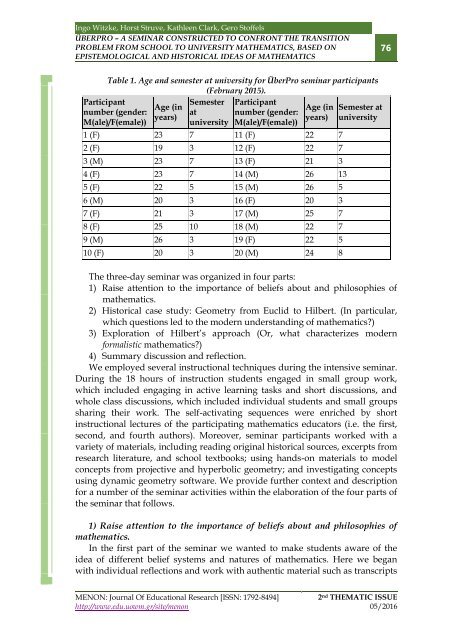MENON
menon_issue_2nd_special_052016
menon_issue_2nd_special_052016
You also want an ePaper? Increase the reach of your titles
YUMPU automatically turns print PDFs into web optimized ePapers that Google loves.
Ingo Witzke, Horst Struve, Kathleen Clark, Gero Stoffels<br />
ÜBERPRO – A SEMINAR CONSTRUCTED TO CONFRONT THE TRANSITION<br />
PROBLEM FROM SCHOOL TO UNIVERSITY MATHEMATICS, BASED ON<br />
EPISTEMOLOGICAL AND HISTORICAL IDEAS OF MATHEMATICS<br />
76<br />
Table 1. Age and semester at university for ÜberPro seminar participants<br />
(February 2015).<br />
Participant<br />
Semester Participant<br />
Age (in<br />
Age (in Semester at<br />
number (gender:<br />
at number (gender:<br />
years)<br />
years) university<br />
M(ale)/F(emale))<br />
university M(ale)/F(emale))<br />
1 (F) 23 7 11 (F) 22 7<br />
2 (F) 19 3 12 (F) 22 7<br />
3 (M) 23 7 13 (F) 21 3<br />
4 (F) 23 7 14 (M) 26 13<br />
5 (F) 22 5 15 (M) 26 5<br />
6 (M) 20 3 16 (F) 20 3<br />
7 (F) 21 3 17 (M) 25 7<br />
8 (F) 25 10 18 (M) 22 7<br />
9 (M) 26 3 19 (F) 22 5<br />
10 (F) 20 3 20 (M) 24 8<br />
The three-day seminar was organized in four parts:<br />
1) Raise attention to the importance of beliefs about and philosophies of<br />
mathematics.<br />
2) Historical case study: Geometry from Euclid to Hilbert. (In particular,<br />
which questions led to the modern understanding of mathematics?)<br />
3) Exploration of Hilbert’s approach (Or, what characterizes modern<br />
formalistic mathematics?)<br />
4) Summary discussion and reflection.<br />
We employed several instructional techniques during the intensive seminar.<br />
During the 18 hours of instruction students engaged in small group work,<br />
which included engaging in active learning tasks and short discussions, and<br />
whole class discussions, which included individual students and small groups<br />
sharing their work. The self-activating sequences were enriched by short<br />
instructional lectures of the participating mathematics educators (i.e. the first,<br />
second, and fourth authors). Moreover, seminar participants worked with a<br />
variety of materials, including reading original historical sources, excerpts from<br />
research literature, and school textbooks; using hands-on materials to model<br />
concepts from projective and hyperbolic geometry; and investigating concepts<br />
using dynamic geometry software. We provide further context and description<br />
for a number of the seminar activities within the elaboration of the four parts of<br />
the seminar that follows.<br />
1) Raise attention to the importance of beliefs about and philosophies of<br />
mathematics.<br />
In the first part of the seminar we wanted to make students aware of the<br />
idea of different belief systems and natures of mathematics. Here we began<br />
with individual reflections and work with authentic material such as transcripts<br />
<strong>MENON</strong>: Journal Of Educational Research [ISSN: 1792-8494]<br />
http://www.edu.uowm.gr/site/menon<br />
2 nd THEMATIC ISSUE<br />
05/2016


